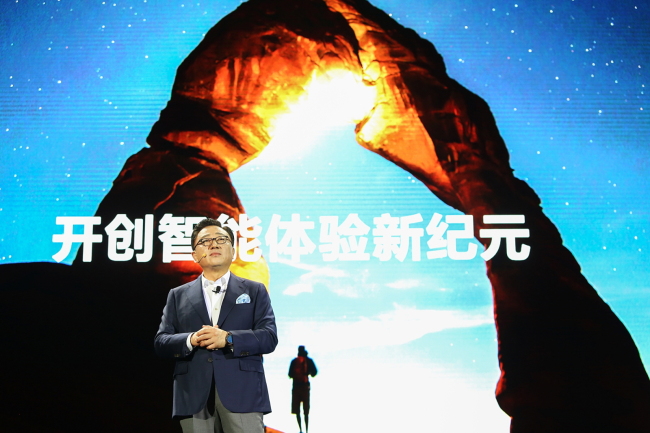Samsung Electronics is aiming to rebound in China with the rollout of its new flagship smartphone Galaxy S8 after losing its market share to local handset makers in recent years. The Korean tech giant unveiled the Galaxy S8 series in China on Thursday with a release date planned for May 25.
“China has been an important market for Samsung Electronics for 25 years since we entered the market in 1992. Samsung will provide the best mobile experience for Chinese consumers through Galaxy S8 series,” said Koh Dong-jin, president of Samsung’s mobile communications business, at a launching event in Beijing.
Alongside the rollout, Samsung plans to provide its voice assistant service Bixby in Chinese language around June and content services in partnership with local companies, including Chinese tech giant Tencent.
The highest-performing model Galaxy S8 Plus with 6 gigabyte random-access memory and 128 gigabyte memory will also be available.
Galaxy S8 and Galaxy S8 Plus will be sold for 5,688 yuan ($825) and 6,188 yuan. The most premium model Galaxy S8 Plus with 128 gigabyte memory will be sold for 6,988 yuan.
With the rollout of the new premium phones, Samsung is aiming to rebound in the world’s largest smartphone market, where the Korean tech giant has been losing its market share to fast-growing local handset makers, including Huawei, Xiaomi, Oppo and Vivo.
“China has been an important market for Samsung Electronics for 25 years since we entered the market in 1992. Samsung will provide the best mobile experience for Chinese consumers through Galaxy S8 series,” said Koh Dong-jin, president of Samsung’s mobile communications business, at a launching event in Beijing.
Alongside the rollout, Samsung plans to provide its voice assistant service Bixby in Chinese language around June and content services in partnership with local companies, including Chinese tech giant Tencent.
The highest-performing model Galaxy S8 Plus with 6 gigabyte random-access memory and 128 gigabyte memory will also be available.
Galaxy S8 and Galaxy S8 Plus will be sold for 5,688 yuan ($825) and 6,188 yuan. The most premium model Galaxy S8 Plus with 128 gigabyte memory will be sold for 6,988 yuan.
With the rollout of the new premium phones, Samsung is aiming to rebound in the world’s largest smartphone market, where the Korean tech giant has been losing its market share to fast-growing local handset makers, including Huawei, Xiaomi, Oppo and Vivo.

In 2013, Samsung took the top spot with nearly 20 percent market share in China but the figure gradually dropped to 13.8 percent in 2014, 7.6 percent in 2015 and 5 percent in 2016.
Its share further dropped to 3.1 percent in the first quarter of this year mainly driven by the recall of Note 7 and Beijing’s economic retaliation against the deployment of the Terminal High Altitude Area Defense System in Korea. In September last year, when the fire-prone Note 7 issue first came to light, Samsung excluded China from the markets where Note 7 would be recalled and replaced, viewing the phones sold in China as safe. Later, some of the Note 7 phones in China were reported to have exploded.
Despite Samsung’s new flagship smartphones, experts said it would not be easy for Samsung to rebound in the nation due to the unsettled THAAD issue and growing local handset makers with cost-effective devices.
“(Due to the political issue and to protect local companies) the Chinese government appears to make state-run telecom carriers support only local handset makers in terms of distribution channels and marketing activities,” said Chung Hae-sik, a researcher at Korea Association for ICT Promotion.
“Plus, as Samsung’s position is awkward, local consumers may not be willing to pay double to buy Galaxy, whose brand power is not as high as Apple and performance is not so ahead of local premium phones,” said he added.
The prices of Huawei’s premium phone P9 and Xiaomi’s Mi currently are around half that of Galaxy S8.
Meanwhile, the global shipment of Galaxy S8 series has so far reached 10 million units since it was first launched on Apr. 21 in Korea and the US. They are being sold in 100 nations including countries in Europe, Central and South America, as well as India, Hong Kong and Singapore and will be available in 20 more countries this month.
Hong Kong-based research firm Counterpoint Research predicted that Galaxy S8 will sell more than 50 million units this year.
By Shin Ji-hye (shinjh@heraldcorp.com)





![[From the Scene] Monks, Buddhists hail return of remains of Buddhas](http://res.heraldm.com/phpwas/restmb_idxmake.php?idx=644&simg=/content/image/2024/04/19/20240419050617_0.jpg&u=20240419175937)




![[Graphic News] French bulldog most popular breed in US, Maltese most popular in Korea](http://res.heraldm.com/phpwas/restmb_idxmake.php?idx=644&simg=/content/image/2024/04/18/20240418050864_0.gif&u=)




![[From the Scene] Monks, Buddhists hail return of remains of Buddhas](http://res.heraldm.com/phpwas/restmb_idxmake.php?idx=652&simg=/content/image/2024/04/19/20240419050617_0.jpg&u=20240419175937)

![[KH Explains] Hyundai's full hybrid edge to pay off amid slow transition to pure EVs](http://res.heraldm.com/phpwas/restmb_idxmake.php?idx=652&simg=/content/image/2024/04/18/20240418050645_0.jpg&u=20240419100350)

![[Today’s K-pop] Illit drops debut single remix](http://res.heraldm.com/phpwas/restmb_idxmake.php?idx=642&simg=/content/image/2024/04/19/20240419050612_0.jpg&u=)